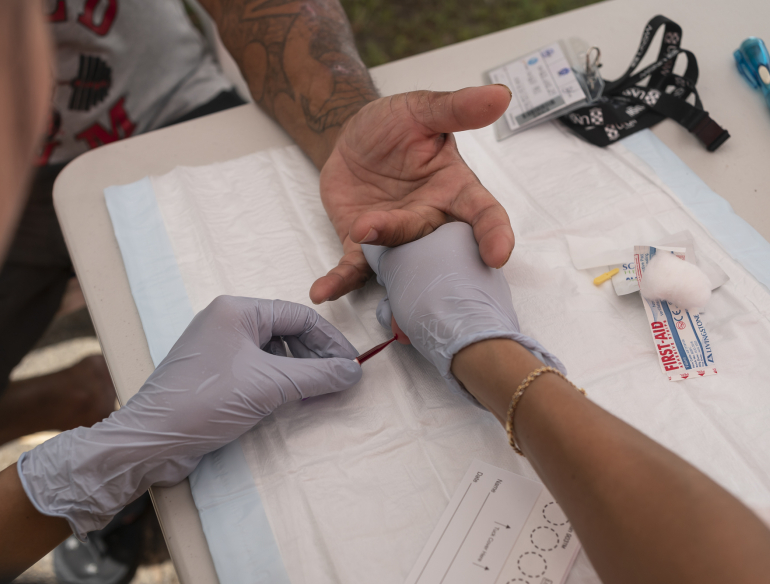The NHMRC has awarded $3 million for a new Centre for Research Excellence (CRE) to accelerate the scale up of point-of-care testing for infectious diseases in Australia and the Asia-Pacific.
Co-led by Professor Rebecca Guy and Associate Professor Tanya Applegate from the Kirby Institute, the CRE, called RAPID 2.0, will bring together researchers, clinicians, laboratory scientists, and community land government leaders from 12 organisations in Australia and 14 countries in the Asia Pacific region. The highly collaborative initiative will conduct research to facilitate the scale-up of point-of-care testing for respiratory, blood borne and sexually transmissible infections across 900 health service and community testing locations. It will also develop the capacity of early and mid-career researchers and community health workers who are leading the delivery of point-of-care testing in the field.
“Infectious diseases are responsible for a significant burden of disease worldwide, but many are preventable and treatable. Yet for half of the world’s population, testing is unavailable because it has historically required access to centralised, sophisticated laboratories,” explains A/Prof Applegate. “However, there have been dramatic advances in point-of-care testing in recent years, and with it the potential to transform health care by placing accurate and affordable diagnostic testing into the hands of health care providers and community members, and effectively integrating it into existing health systems.”
The CRE will build on RAPID 1.0, which piloted point-of-care testing among priority populations including First Nations people, people who inject drugs, women, children, pregnant women and their newborns and people living in remote communities. RAPID 1.0 successfully demonstrated the acceptability, clinical benefit and cost-effectiveness of this mode of testing delivery, while identifying barriers to wide-scale use.
“Through the first iteration of RAPID, we were able to identify key roadblocks to achieving widespread access to point-of-care testing,” says A/Prof Applegate. “In this new iteration, we will implement optimal pathways to scale up point-of-care testing by strengthening health systems, enhancing integration of state-of-the art technologies into clinical practice and extending its reach. Importantly, RAPID 2.0 will bring together programs addressing a wide range of diseases that were previously siloed, under the one umbrella.”
The implementation research program will be the one of the largest globally focused on the scale up of point-of-care testing for such a wide range of diseases, and with 2030 fast approaching, the program will facilitate the expanded access to testing required to achieve the World Health Organization’s disease control and elimination targets.
“Point-of-care testing is one of the great medical innovations, and through our ongoing research and program delivery since 2015, we have been able to demonstrate its effectiveness, acceptability and applicability in a range of resource-limited settings,” says Prof Guy. “By bringing together multiple priority disease areas and locations within RAPID 2.0, and expertise across a broad range of disciplines, we have the opportunity to deliver tangible, significant and sustainable health benefits to communities in Australia and the region.”
Other Kirby Institute Chief Investigators on RAPID 2.0 are Professors Jason Grebely, Andrew Vallely, Virginia Wiseman, and Angela Kelly-Hanku. Kirby Institute Associate Investigators on RAPID 2.0 are Dr Louise Causer, Emily Phillips, Dr Lise Lafferty and Associate Professor Richard Gray.
